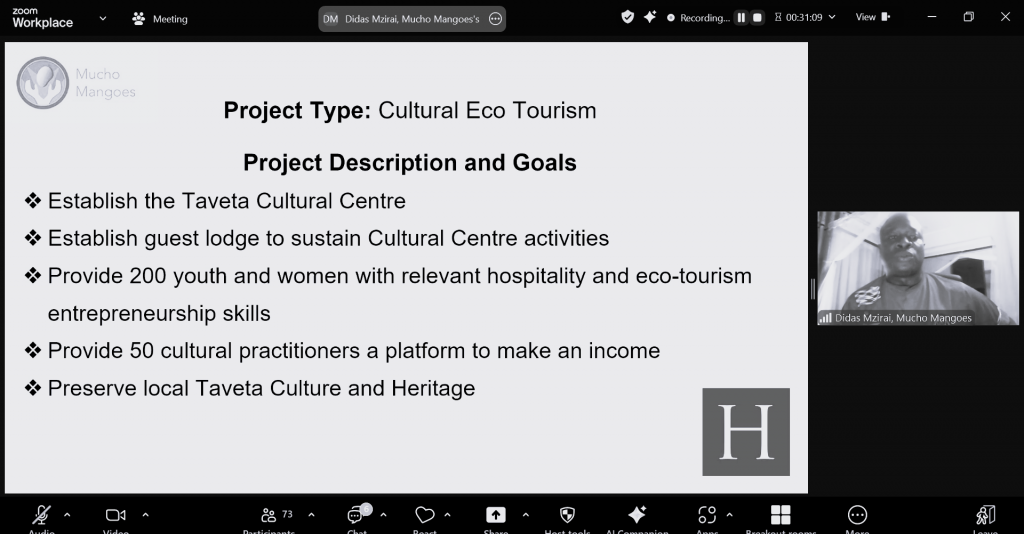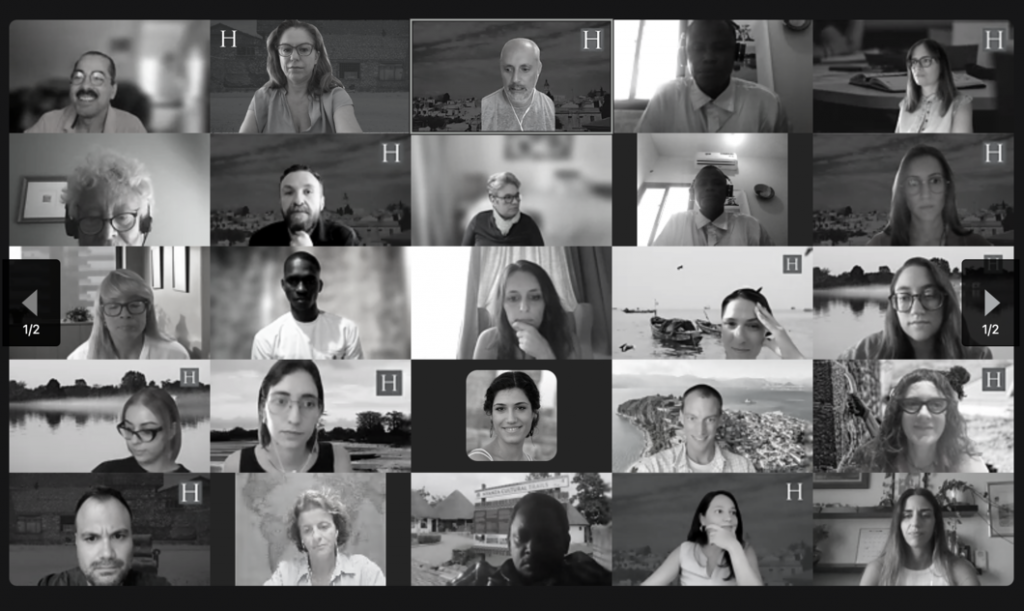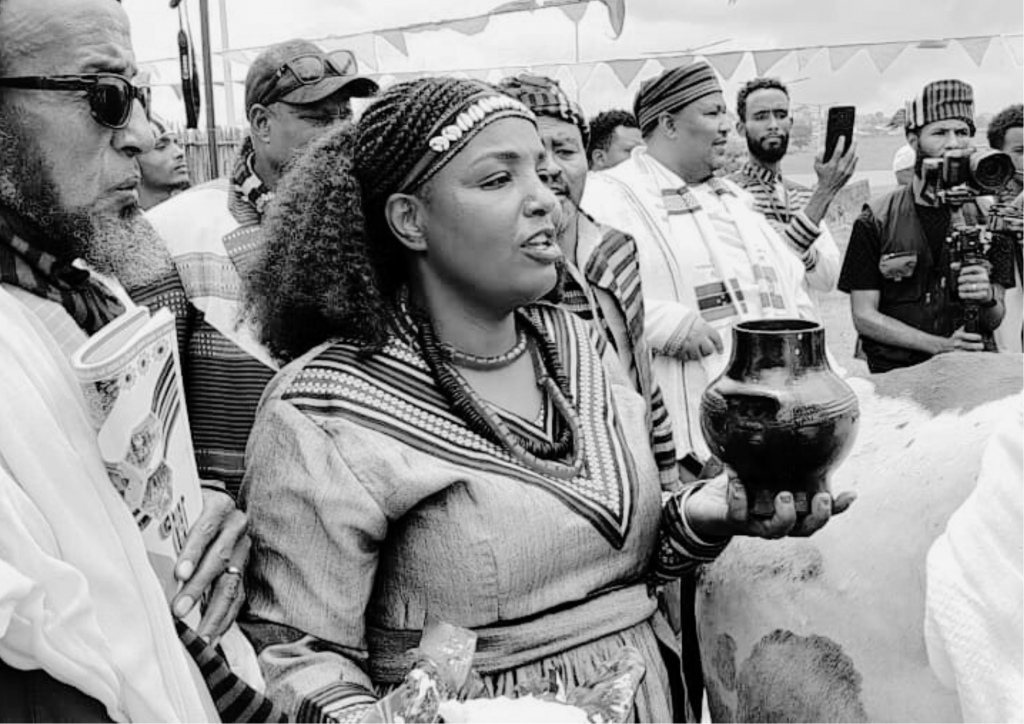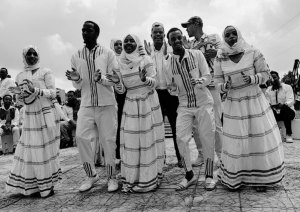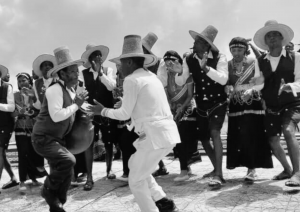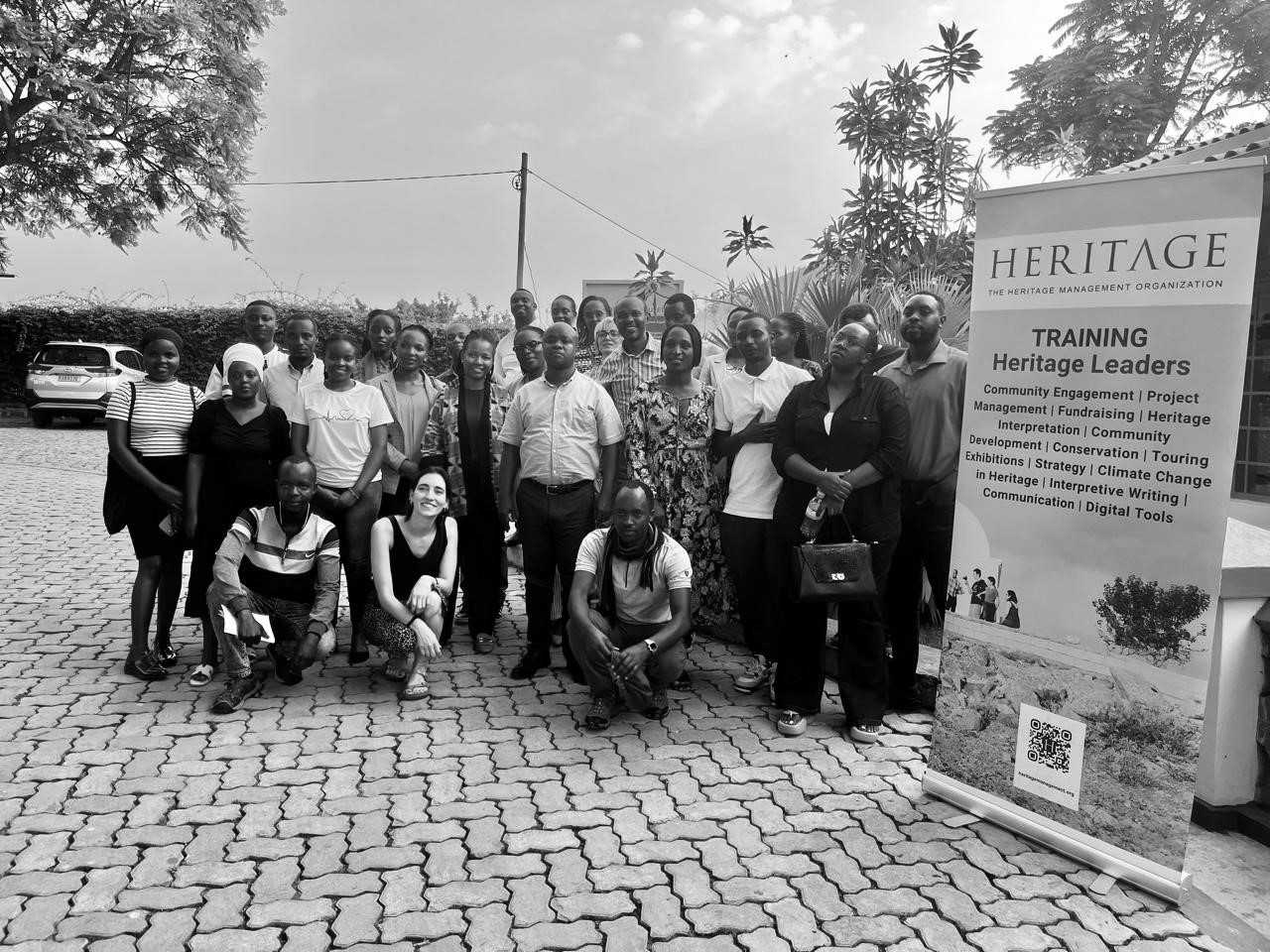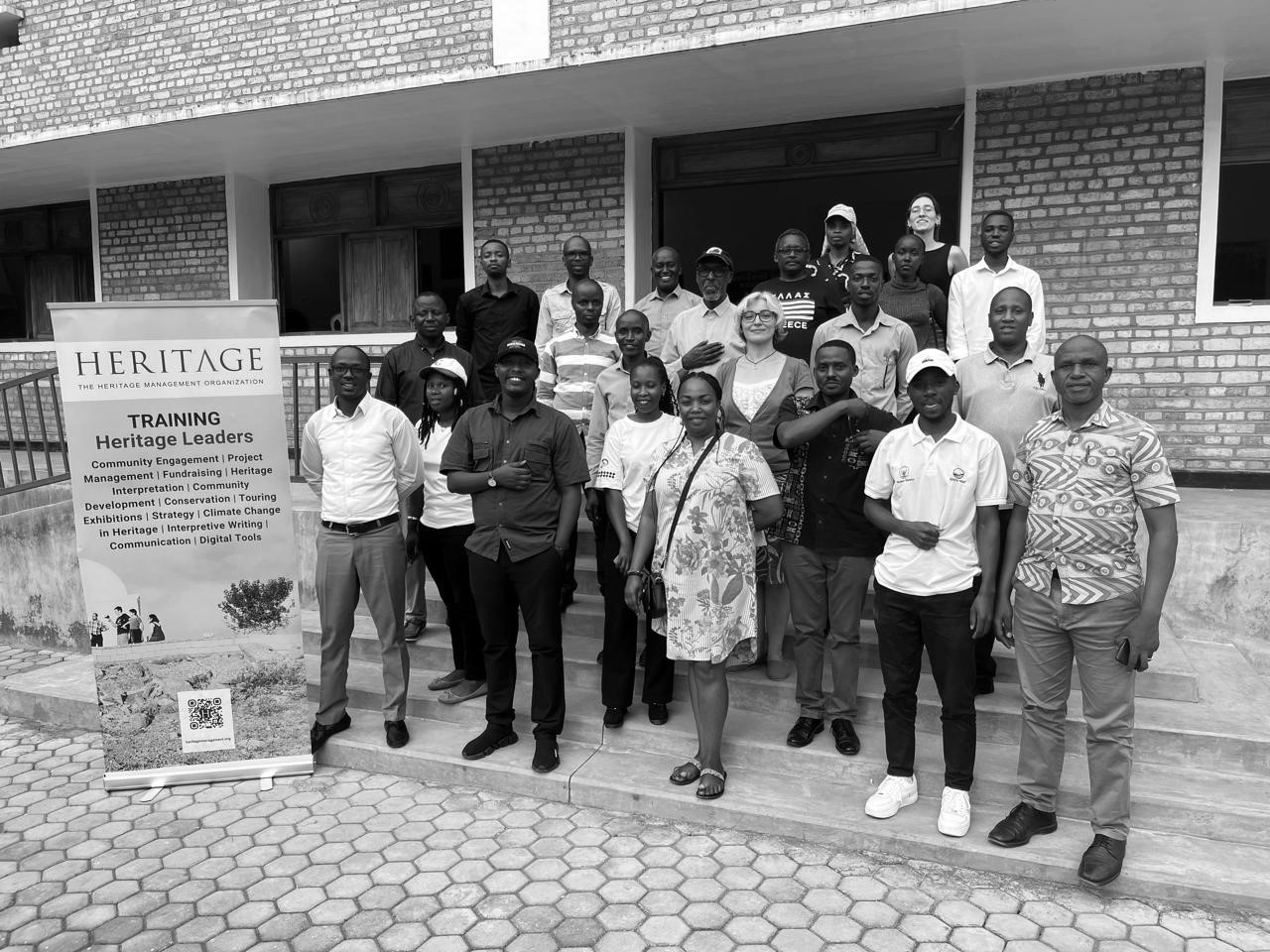Tag Archives: HerMaP Africa
Second Online Networking Convening of Africa Grantees
On 30th April, our Africa Grants Team hosted the Second Networking Convening for recipients of our Small Grants for Africa, bringing together over 60 participants from across Africa for a virtual session. Our small grants initiative is made possible with the support of the Mellon Foundation.
The event featured grantees, HERITΛGE staff, members of the Re-granting Committee, and representatives from several foundations, including the Mellon Foundation, ALIPH Foundation, Arcadia Fund, DRK Foundation, and Kaplan Foundation. 12 grantees presented projects from Algeria, Eswatini, Ghana, Nigeria, Rwanda, South Africa, Tanzania, Uganda and Zambia. They showcased a broad range of community-driven heritage work, from the restoration of Keana Salt Village in Nigeria to the conservation of rock paintings in Uganda.
“ Heritage and culture are so important in many different ways in addressing social issues, economic issues and environmental issues”
Justin Garrett Moore, Director, Mellon Foundation’s Humanities in Place Program
After the presentations, Justin Garrett Moore from the Mellon Foundation highlighted the significant role that heritage plays in addressing various societal challenges. “We’ve supported this work because heritage and culture are so important in many different ways in addressing social issues, economic issues, and environmental issues. And I think all of the work you’ve shared here today has been showing jus the power that work has,” he told attendees./
The convening concluded with a breakout session, where participants were divided into smaller groups to discuss their projects more informally. It was also a great opportunity for participants to network with each other and promoted collaborations between individuals and groups.
This was the second out of six planned events aimed at showcasing projects funded through our Small Grants for African Heritage Projects initiative, made possible through generous funding by the Mellon Foundation. 75 projects have received around $1million in funding. You can read more about the specific projects on our Africa Grants page which is continually being updated.
First Online Networking Convening of Africa Grantees
“It is important to have capacity building, to have knowledge sharing, to have networks to increase solidarity in what is very challenging work.”
Justin Garrett Moore, Director, Mellon Foundation’s Humanities in Place Program
Last month, we held our first Online Networking Convening of the 2024 Africa Grants Programme. The meeting, which was attended by representatives from 49 organisations, was a fantastic opportunity for grant recipients to share the successes of their projects with other grantees. It was also a chance to celebrate the projects and thank everyone involved including representatives from the Mellon Foundation’s Humanities in Place Program and the Re-granting Committee members.
Richard Brown opened the meeting by outlining the positive impact of the Africa Grants Programme which has provided over $1,000,000 to 75 organisations in 32 countries across Africa. HERITAGE Director, Evangelos Kyriakidis, then emphasised the importance of the meeting itself as an opportunity for grantees to learn from other heritage professionals across the continent to build a stronger heritage sector saying “it is the only continent where there is such enormous diversity and wealth of heritage alive”.
This diversity was emphasised in the following presentations where 12 organisations outlined what each grant had been used to fund. These projects included tangible and intangible heritage, natural and built, covered a range of cultures, varying religions and spanned eight different countries including Kenya, Ghana, Malawi, Ethiopia, Nigeria, Uganda, Zimbabwe and South Africa.* You can read more about the specific projects on our Africa Grants page, but it was a great opportunity to hear directly from the teams who have worked so diligently to champion their heritage. We look forward to hearing from more organisations in the following meetings!
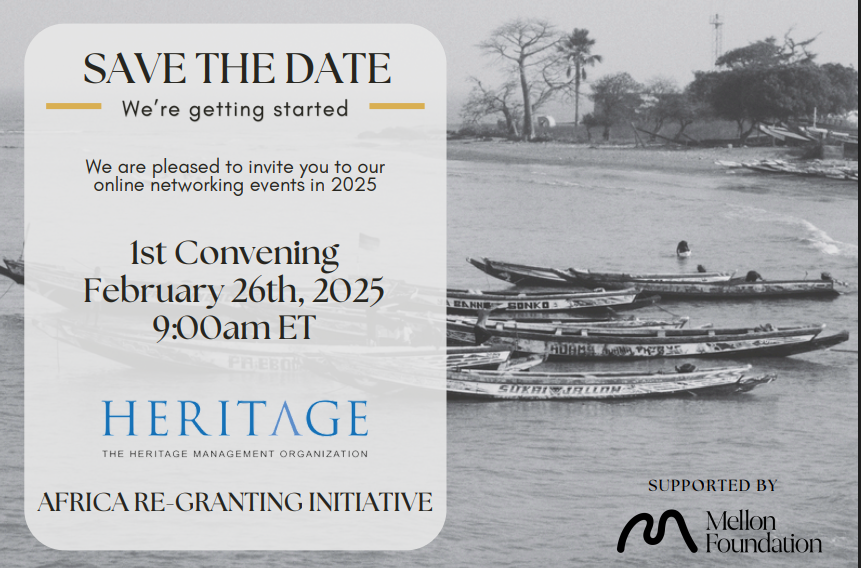 *The 12 projects presented at the first meeting included:
*The 12 projects presented at the first meeting included:
Mahmoud Malik Saako | Ghana: ‘Islamic Heritage in northern Ghana’
Vitalice Ochieng | Kenya: ‘Cultural Heritage Promotion and Conservation of the Kaya Forests, Kenya’
Chifundo Dalireni | Malawi: ‘Protecting Chongoni heritage sites through community participation and effective governance’
Getinet Fetene Engida | Ethiopia: ‘Protecting Heritages in monasteries of UNESCO Lake Tana Biosphere Reserve’
William Mutta Tsaka | Kenya: ‘Restoration Work and Museum Establishment at Masee House in Kenya’
Moses Mkumpha | Malawi: ‘Restoration of Anti-Slave trade buildings and opening of Museums’
Daniel Ishaya Mwada | Nigeria: ‘Rehabilitation of Rabih’s Fort, Dikwa National Monument’
Kamya Stephen Kyobe | Uganda: ‘Uganda bark cloth revitalization Consortium; promoting communal Conservation / protection’
Eunitah Viriri | Zimbabwe: ‘Towards the Preservation and Promotion of Matendere Ruins in Zimbabwe’
Didas Mzirai | Kenya: ‘Bustani Resort – The Taveta Cultural and Agro-Ecotourism Center’
Njung Gislane Bih | Nigeria: ‘Solarization of National Museum Onikan (Lagos)’ (presentation delivered by her partner Tolulope Falola)
Tracey Viljoen | South Africa: ‘The Fisher Child and other stories. Sites of memory project’
HERITΛGE Highlights 2024
Training
HERITΛGE celebrated a record-breaking milestone in 2024, training over 1,000 heritage caretakers in a single year. Participants engaged in a wide range of programs, including three-day workshops conducted online and in person, two annual summer schools focusing on digital tools and community engagement, and specialized training tailored to specific regions, topics and organizations. These included programs on Street Art in The Gambia (which also produced a new mural for the country’s National Centre for the Arts and Culture), Heritage interpretation in Rwanda, Project Management for US Heritage Managers, and an introduction to Fundraising and Project Management in Iraq.
Heritage Threatened by Conflict, Natural Disasters, and Climate Change
HERITΛGE continued its mission to protect heritage at risk worldwide, strengthening existing partnerships and forging new ones. In Ukraine, the Digital Museum project that was funded by the Creative Europe’s Culture Helps initiative, trained museum professionals to use digital tools, ensuring operational continuity and community access during wartime. Simultaneously, the two-year Architecture in Times of War: The Ukrainian Model initiative – delivered in cooperation with the Kharkiv School of Architecture and Skeiron and the support of the US Embassy in Kyiv – is equipping students and educators with digital skills to document, preserve, and restore architectural heritage.
In Türkiye, HERITΛGE published comprehensive reports documenting historic sites affected by the February 2023 Türkiye-Syria earthquakes. These reports include protection recommendations and advocate for enhanced cultural heritage recovery in affected provinces. Meanwhile, in Pakistan, a new project launched to safeguard the early Buddhist heritage of the Swat Valley, an area under threat from conflict, climate change, and rapid development. In Yemen, efforts continued to preserve the unique earthen architecture of Shibam, a UNESCO World Heritage Site struggling under the weight of a decade-long civil war.
HERITΛGE in Africa
The HerMaP Africa initiative, generously supported by the Mellon Foundation, has delivered significant impact. Over 75 small heritage projects received funding, alongside the awarding of several fellowships and the training of more than 370 heritage managers in Ethiopia, Ghana, and Rwanda. New partnerships were also established to further these efforts. In The Gambia, HERITΛGE’s ongoing HerMaP Gambia initiative, co-funded by the European Union, provided training to enhance the country’s culture and tourism sectors. The program also facilitated a parliamentary delegation study tour in Greece and partnered with the NCAC to launch the country’s Intangible Cultural Heritage Register, a project supported by UNESCO.
Giving Heritage Managers New Tools
HERITΛGE made strides in empowering heritage managers with innovative tools and practices. The EU-funded SHIFT project advanced its work to make heritage more accessible and inclusive, with a consortium meeting and project presentation held in Athens. The AHEAD initiative, co-funded by the European Union’s Creative Europe program, introduced seminars (now available online) and launched a community-based artistic project in Crete, with similar activities planned for Italy and Spain. HERITΛGE also announced the launch of EMPATHS, a project designed to promote participatory heritage interpretation through new tools and training resources.
Creating Networks, Connecting Professionals
Collaboration and community-building remained central to HERITΛGE’s mission in 2024. The organization continued developing Greece’s Living Heritage Network, supported by the Ministry of Culture, with HERITΛGE actively contributing to its digital and physical infrastructure, member recruitment, and communications. Additionally, the newly established AHEAD Network brings together heritage managers and community members who share a vision of audience engagement and participation.
Knowledge Sharing
HERITΛGE emphasized the importance of knowledge-sharing through active participation in global events and publications. Director Dr. Evangelos Kyriakidis delivered a keynote at the Choc Des Legendes Conference in Ghana, held under the auspices of the country’s First Lady. The organization also sponsored PastForward 2024, the annual conference of the US National Trust for Historic Preservation. Other highlights included workshops and presentations at the 30th Annual Meeting of the European Association of Archaeologists and the ReImagining Public Collections conference in Hungary.
HERITΛGE contributed to a Horizon Europe-funded policy brief on digital cultural heritage and shared expertise through webinars, seminars, and public lectures. Notable online resources include audience development webinars from the AHEAD initiative and webinars on architectural preservation in Ukraine.
1st Global Staff Summit
Reflecting the growth in HERITΛGE’s activities and team, the organization hosted its inaugural Global Staff Summit in September. This online event brought together staff working in Africa, Asia, Europe and the Americas , marking the beginning of an annual tradition to foster collaboration and alignment across our expanding network.
Yahode Festival: Beacon for peace, reconciliation, and renewal in Ethiopia
Written by: Habtamu Gizawu Tola & Xanthippi Kontogianni
Ethiopia’s rich cultural landscape is a testament to its diverse heritage, and the Yahode festival stands as one of the most vibrant expressions of this legacy. Celebrated annually by the Hadiya people in the Central region, Yahode marks the New Year and is a significant Thanksgiving event, embodying the values of peace, reconciliation, and renewal. More than just a cultural celebration, Yahode offers organizations like the Heritage Management Organization a unique opportunity to forge connections with local stakeholders, assess the needs of Ethiopia’s heritage sector, and enhance heritage management capabilities in a meaningful way.
At the heart of Yahode is a powerful transition—from the darkness of the old year to the brightness of the new—imbued with forgiveness, gratitude, and the promise of fresh beginnings. This festival is a living symbol of unity and social cohesion, critical to the preservation of cultural heritage and the promotion of sustainable development. It showcases both the tangible and intangible aspects of Hadiya culture, from intricately decorated clothing and traditional cuisine to ritual prayers, conflict resolution systems, and dynamic performances of traditional songs. Yahode encapsulates the essence of living heritage, offering a snapshot of the values and practices that define the Hadiya community.
The festival begins with “Atakana Night,” a symbolic eve of transformation marked by cultural bazaars, panel discussions, community dialogues, and fashion shows. This gathering involves a broad spectrum of participants, from local community members and cultural organizations to government stakeholders, all contributing to the festival’s dynamic atmosphere. Following the eve, the main day of Yahode unfolds with a solemn blessing and prayer ceremony led by elders, giving thanks for the past year and seeking peace and unity for the year ahead. Traditional songs and dances performed by youth groups, alongside the Damara (Tomora) ceremony—where decorated firewood is blessed and burned to symbolize new beginnings—enrich the celebration. The day culminates in the ceremonial slaughtering of a specially selected ox, its meat shared among participants, reinforcing community unity and collective celebration.
The Yahode festival represents far more than a celebration of heritage; it is a microcosm of the social, economic, and spiritual fabric of the Hadiya people. The active participation of the Heritage Management Organization, represented by Habtamu Gizawu Tola (focal person of HERITΛGE in Ethiopia), at the Yahode festival on September 27-28, 2024, provided an invaluable platform for achieving two key objectives: building robust networks with stakeholders and gaining a deeper understanding of the local heritage sector’s strengths and needs. Engaging in such cultural events is crucial for organizations seeking to not only preserve heritage but also integrate it into broader developmental goals. By embedding itself in the cultural life of Ethiopia’s communities, the Heritage Management Organization can play a transformative role in ensuring that Ethiopia’s rich heritage continues to drive social and economic progress, fostering a future where cultural legacy and modern development walk hand in hand.
*Habtamu Gizawu Tola is HERITΛGE’s focal representative in Ethiopia and has also taken the photos featured here. Xanthippi Kontogianni is the organization’s Ethiopia Heritage Manager.
HERITΛGE in the News
Our teams are working around the world to fulfill the HERITΛGE mission. Here is how some of our work has been featured in the press in the last few months.
Heritage Threatened by Conflict
HERITΛGE has launched a new project to safeguard Ukraine’s cultural heritage. Architectural Heritage Preservation in Times of War: The Ukrainian Model is being realized in cooperation with the Kharkiv School of Architecture and Skeiron, with generous support from the U.S. Embassy’s Public Diplomacy Section in Ukraine. The project has been featured in the latest issue of Popular Archaeology as well as in Ukrainian media.
HerMaP Gambia
The Gambia’s National Assembly’s Committee for Culture and Tourism recently embarked on a Parliamentary Study Tour in Thessaloniki. This visit, conducted as part of the HerMaP Gambia program co-funded by the European Union, was widely covered in the Gambian media, including prominent news programs and The Voice newspaper.
Watch the QTV bulletin (start at 14:18) or read the article in The Voice.
HERITΛGE also delivered workshops in The Gambia on various aspects of cultural management, including Festival Management, which was covered by The Voice.
African Heritage Grants
HERITΛGE’s small grants for African heritage initiative, supported by the Mellon Foundation, recently funded Restoring Ilukwe House, a project by the NGO Legacy to restore a historic building in Lagos’ railway compound. Coverage of this initiative appeared in Nigeria’s The Guardian.
The Republic, a Nigeria-based magazine and platform of socio-economic and political commentary, criticism and cultural discourse, has received a substantial grant from the Mellon Foundation to support its mission to establish itself as a regional, leading hub/platform for Black and Africa-focused ideas and critical perspectives; and to further connect Africa and the African diaspora on critical issues, with the help of HERITΛGE.
Greek Living Heritage Network
As a founding member of the Living Heritage Network in Greece, HERITΛGE continues to support and celebrate Greece’s living heritage. Theodosia Maroutsi recently discussed the Network on NaMaste, a cultural program on Greece’s national broadcaster ERA2.
Greek speakers can listen to the show here.
Heritage Interpretation In Rwanda
49 heritage professionals from Rwanda took part in two recent Introduction to Heritage Interpretation Workshops, led by HERITΛGE’s Valia Stergioti. The participants included officials from educational institutions, heritage sites, tourist businesses, local communities and NGOs.
During the workshop, which was led in person by HERITΛGE’s Valya Stergioti, they were introduced to the skills that allow heritage managers to transform mere phenomena into captivating experiences. They learned how to evoke a deep resonance within visitors at heritage sites of natural and/or cultural significance, guiding them towards profound insights and nurturing an appreciation for all aspects of heritage. Additionally, participants developed the ability to provide and receive constructive feedback to and from their peers.
The first of the two workshops was delivered in cooperation with the Rwanda Cultural Heritage Academy to 26 heritage and tourism professionals and took place on 24-26 July at the Rwanda Heritage Hub and the Kandt House Museum in Kigali.
“I learned to connect our participants to the site, which will help to increase our visitors satisfaction” said Esther Kakuze, Managing Director of ImuHira Ecotourism Rwanda who took part in the workshops.
“My project and institution will benefit through my professional practice,paying attention to all details related to heritage Management and community engagement,” said Wilhelm Mugiramahoro, Operations Officer for the Rwanda Cultural Heritage Academy.
The second workshop was delivered in cooperation with Nyanza District to 23 heritage and tourism professionals in the Nyanza District’s Visitor Centre.
“I have gained new skills as the heritage interpretation workshop was a new subject to me. I will use them so my visitors can enjoy our site and be our ambassadors, ” siad Sandrine Uwambayinkindi from the Girampuhwe Visitor Centre.
Both workshops are part of our HerMaP Africa program which is realised with the generous support of the Mellon Foundation’s Humanities in Place program.


